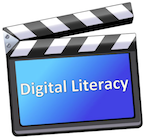 We’re coming towards the end of what has been an interesting and challenging phase of the project. From the outset we were acutely aware of the need to win over hearts as well as the minds of those in the University who are best placed to catalyse and promote the development of digital literacy. With this aim we focused our efforts on engaging and meeting with key individuals and groups across the University to identify how we could embed the development of digital literacy into relevant processes and mechanisms. Progress to date has been very encouraging indeed, with a number of strategies, action plans and initiatives now incorporating digital literacy as an integral component. This success will ensure that digital literacy remains in forefront of people’s minds and continues to be an agenda item for some time to come.
We’re coming towards the end of what has been an interesting and challenging phase of the project. From the outset we were acutely aware of the need to win over hearts as well as the minds of those in the University who are best placed to catalyse and promote the development of digital literacy. With this aim we focused our efforts on engaging and meeting with key individuals and groups across the University to identify how we could embed the development of digital literacy into relevant processes and mechanisms. Progress to date has been very encouraging indeed, with a number of strategies, action plans and initiatives now incorporating digital literacy as an integral component. This success will ensure that digital literacy remains in forefront of people’s minds and continues to be an agenda item for some time to come.
We took our initial lead from the University’s Education Strategy, which was invaluable in highlighting digital literacy in the broader context of Learning Literacies. This provided us with the impetus to be able to ask questions of the other University strategies as to how they could engage with this as a driver. We have had extremely positive and fruitful collaborations in such areas as Careers and Employability with the opportunity to feed into their action plan, with the Equality and Diversity group contributing to the Strategic Equality Plan, also close involvement with the development of the University’s Social Media Strategy and the Information Services Digital and Information Literacy Strategy, which was recently fully endorsed by its Board. Work now continues with these various groups to identify from a practical standpoint how Digital Literacy can best be realised in the short to medium term.
This is now leading into more grassroots and hands-on engagement with teaching staff to help them detail appropriate learning opportunities. Examples of this are our collaborations with academics responsible for planning and developing the new C21 Medical Curriculum to specify how both Information Literacies and Digital Literacies can be integrated in an evolutionary way throughout the 5 year course. We are also working with people leading the Cardiff Award scheme to specify content and activities for undergraduates to develop their digital literacy with a view to future employability. And workshops are planned with front-facing staff in Library and IT Services to explore how their own digital and information literacy might be developed and also how they in turn might better enable its development in others.
So, looking back over the first year of the project, much has been achieved in terms of raising people’s awareness about the significance of developing Digital Literacy and making the conversation happen. This has proved invaluable in helping to clarify where and how the project can best contribute to facilitate practice at the ‘coal-face’. This nicely leads us into the next phase of the project which is all about developing and gathering resources and running workshops to give staff and students an opportunity explore what developing their digital literacy actually entails when doing their work and learning.
